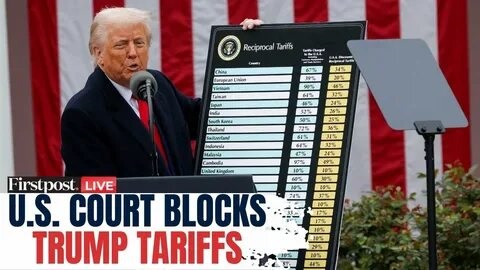
A federal court ruled President Trump does not have the authority under economic emergency legislation to impose sweeping global tariffs, AXIOS reports.
Why it matters: The U.S. Court of International Trade's ruling could bring the administration's trade war to a screeching halt.
By blocking entirely most categories of tariffs, the court effectively wiped out most of the regime Trump put in place since taking office.
Driving the news: The court, ruling in two separate cases, issued a summary judgment throwing out all the tariffs Trump imposed under the International Emergency Economic Powers Act, or IEEPA.
Trump used the 1977 law, which had never before been invoked in a tariff situation, to unilaterally impose sweeping trade levies worldwide.
The two groups of plaintiffs — businesses and states — sued on the grounds that the president's orders violated the Constitution's grant of authority over import duties to Congress.
The administration filed a notice of appeal soon after the ruling.
Zoom in: "The question in the two cases before the court is whether the International Emergency Economic Powers Act of 1977 ("IEEPA") delegates these powers to the President in the form of authority to impose unlimited tariffs on goods from nearly every country in the world," the three-judge panel wrote.
"The court does not read IEEPA to confer such unbounded authority and sets aside the challenged tariffs imposed thereunder."
Tariffs imposed under a different legal authority called Section 232 — including on imports of autos, steel and aluminum — are unaffected by the ruling.
For the record: The court, which gets relatively little attention compared to most other federal courts, has jurisdiction over civil cases arising from trade disputes.
The three judges who heard the case were Reagan, Obama and Trump appointees.
What they're saying: "It is not for unelected judges to decide how to properly address a national emergency," White House spokesperson Kush Desai said in a statement in response to the ruling.
"President Trump pledged to put America First, and the Administration is committed to using every lever of executive power to address this crisis and restore American Greatness."
White House deputy chief of staff Stephen Miller said, "The judicial coup is out of control."
The other side: Oregon Attorney General Dan Rayfield (D), whose office is leading the states' suit, in a statement said they brought the case "because the Constitution doesn't give any president unchecked authority to upend the economy."
The ruling "reaffirms that our laws matter, and that trade decisions can't be made on the president's whim," he added.
New York Attorney General Letitia James, who joined the suit, said in a statement the law makes clear that "no president has the power to single-handedly raise taxes" whenever they like.
"These tariffs are a massive tax hike on working families and American businesses that would have led to more inflation, economic damage to businesses of all sizes, and job losses across the country if allowed to continue," she said.
The intrigue: The court skipped over the plaintiffs' motions for an injunction and went directly to issuing a judgment, saying IEEPA did not authorize any of the "Worldwide, Retaliatory or Trafficking" orders.
"The challenged Tariff Orders will be vacated and their operation permanently enjoined," the court wrote.
What to watch: With tariffed goods arriving at U.S. ports every day, the confusion over what's in force and what to charge could throw imports into chaos.
Markets, and businesses, will likely be paying rapt attention in coming days to how the administration responds and whether higher courts intervene.
"[It] gives foreign governments — once compelled to negotiate new terms of the trade agreements the Trump administration broke — significant new leverage in ongoing trade talks," said Scott Lincicome, vice president of the Cato Institute's Stiefel Center for Trade Policy Studies, in a statement.
read more in our Telegram-channel https://t.me/The_International_Affairs

 11:30 30.05.2025 •
11:30 30.05.2025 •






















